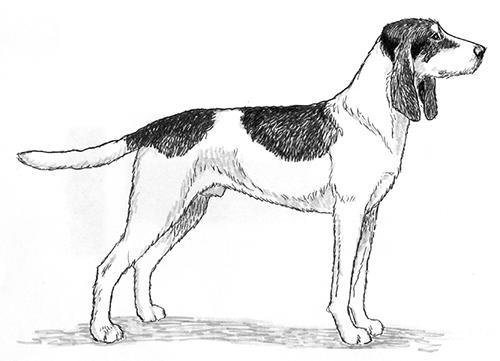- Breed Category: Hound
- Country of Origin: Wales
- Average Height: 48-56 cm (19-22 inches)
- Average Weight: 18-27 kg (40-60 pounds)
- Average Life Span: 12-15 years
- Grooming Requirements: Low, occasional brushing
- Exercise Requirements: High, needs daily exercise
- Coat Type: Short and dense
- Coat Color Variations: Various, often tricolour
- Shedding Level: Moderate
- Ear Type: Drop ears
- Tail Type: Long and straight
- Temperament: Friendly, energetic, intelligent
- Intelligence Level: High
- Barking Tendency: Moderate
- Compatibility with Children: Good, very friendly
- Compatibility with Other Pets: Generally good
- Training Ease: Moderate, can be stubborn
- Common Health Issues: Hip dysplasia, ear infections
- Dietary Needs: High-quality, balanced diet
- Energy Level: High
- Drooling Tendency: Low
- Sensitivity to Weather: Moderate, prefers mild climates
- Overall Maintenance Level: Moderate
- Original Purpose: Hunting and tracking
- Apartment Friendly: Not ideal, needs space
- Best Suited For: Active families, rural settings
- Cost of Ownership: Moderate
- Unique Traits: Excellent scenting ability
Imagine a dog with a keen nose, boundless energy, and a history as rich as the Welsh countryside. That’s the Welsh Hound for you. This breed, known for its hunting prowess, has been a part of Welsh culture for centuries. The purpose of this article is to delve into the characteristics, history, and care of the Welsh Hound, offering insights into what makes this breed unique.
The Welsh Hound’s origins trace back to ancient times, where they were bred for their exceptional hunting skills. These dogs were essential companions for hunters, prized for their ability to track and chase game across rugged terrains. Understanding their history helps appreciate their traits and needs today, ensuring they thrive in modern homes.
Welsh Hound: A Glimpse into Its Storied Past
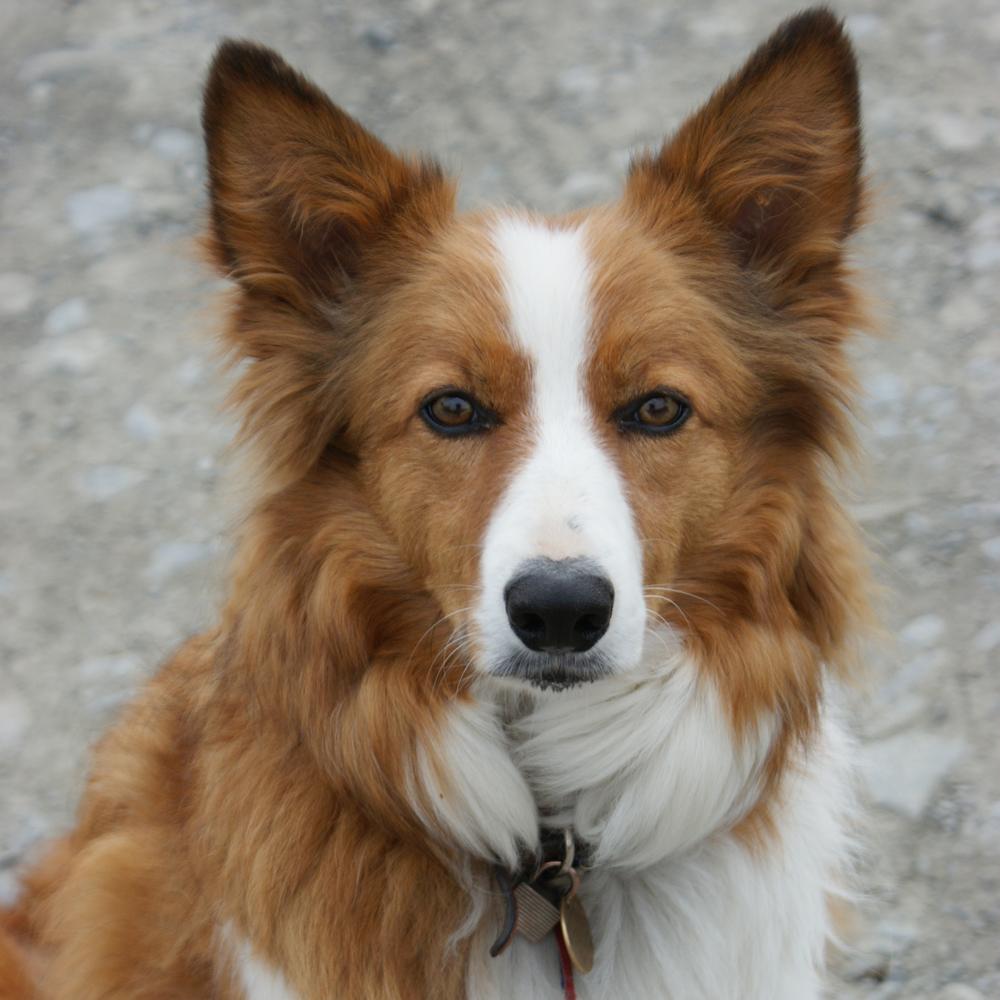
Early Development of the Breed
The Welsh Hound’s journey began in the misty hills of Wales, where they were meticulously bred for their hunting prowess. These dogs were crafted to be agile and resilient, capable of navigating the challenging Welsh landscape. Their development was a careful process, focusing on enhancing their scenting abilities and stamina.
Role in Welsh Hunting Traditions
In the heart of Welsh hunting traditions, the Welsh Hound played a pivotal role. They were the trusted allies of hunters, known for their relentless pursuit of game. Their keen sense of smell and unwavering determination made them indispensable in the hunt, often leading the charge in tracking elusive prey.
Key Historical Figures
Several key figures in Welsh history contributed to the breed’s development. These individuals recognised the hound’s potential and worked tirelessly to refine their abilities. Their dedication ensured the Welsh Hound’s place in history as a premier hunting companion.
Physical Characteristics
Physically, the Welsh Hound is a sight to behold. They boast a strong, athletic build, with a coat that can withstand the elements. Their expressive eyes and alert ears reflect their intelligence and readiness for action. This breed is not just about looks; their physical traits are perfectly suited for their historical role in hunting.
Appearance and Unique Physical Traits
The Welsh Hound is a medium to large-sized dog, known for its robust and athletic build. Their coat is typically short and dense, offering protection against the harsh weather of the Welsh countryside. Coat colours can vary, but you’ll often see them in shades of red, tan, or black, sometimes with distinctive white markings that add to their striking appearance.
One of their most notable features is their strong, muscular frame, which is perfectly suited for the demanding task of hunting. Their long legs and deep chest give them the stamina needed for long pursuits, while their expressive eyes and alert ears showcase their intelligence and readiness for action.
Temperament and Behaviour
Welsh Hounds are known for their friendly and sociable nature. They thrive on companionship and are happiest when they’re part of a pack, whether that’s with other dogs or their human family. These dogs are energetic and require plenty of exercise to keep them content. They’re not just about physical activity, though; they also need mental stimulation to satisfy their curious minds.
While they have a strong hunting instinct, Welsh Hounds are generally good-natured and get along well with children and other pets. Their loyalty and eagerness to please make them wonderful companions for those who can match their active lifestyle.
Personality Traits and Suitability
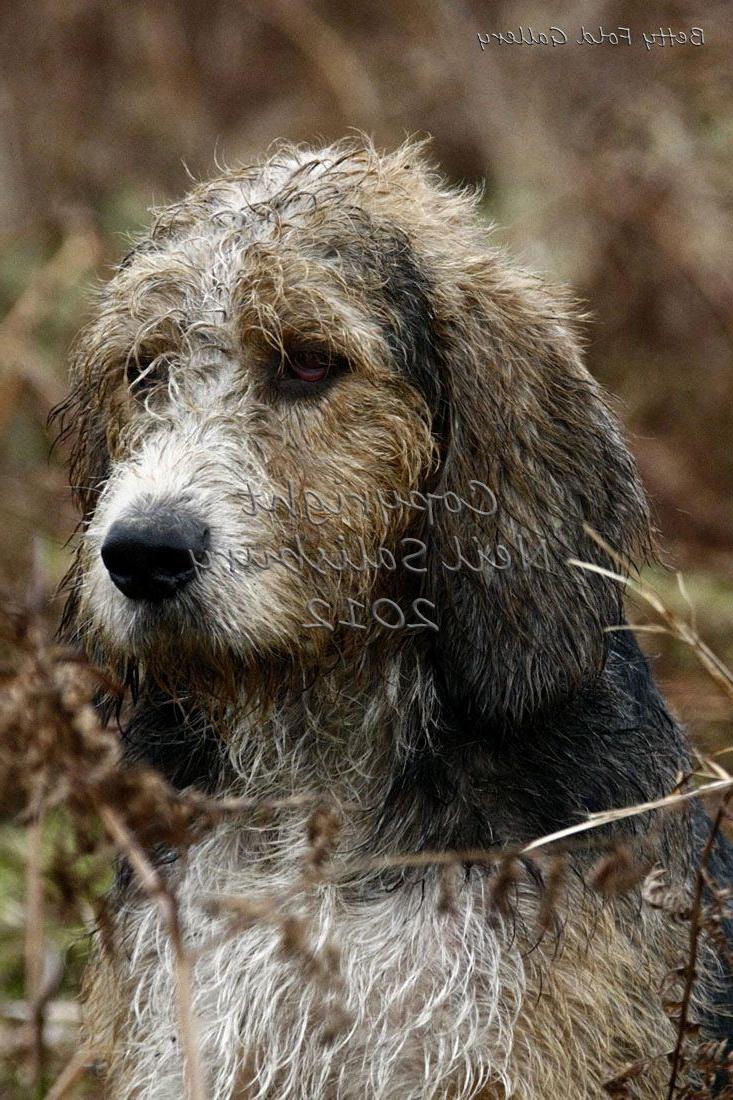
Typical Personality Traits
The Welsh Hound is a bundle of loyalty and intelligence, always eager to be part of the action. Their high energy levels mean they’re always ready for a run or a game, making them perfect for active families. These dogs are not just smart; they’re intuitive, often picking up on their owner’s moods and needs.
Suitability as a Family Pet and Hunting Companion
As a family pet, the Welsh Hound is a joy. Their loyalty and friendly nature make them great companions for both adults and kids. They’re also excellent hunting partners, thanks to their keen sense of smell and stamina. If you’re looking for a dog that can keep up with your outdoor adventures, this breed is a top choice.
Interaction with Children and Other Animals
Welsh Hounds are generally good with children, showing patience and playfulness. They tend to get along well with other animals, especially if socialised early. Their pack mentality means they enjoy being part of a group, whether it’s with humans or other pets.
Training and Exercise Needs
Training a Welsh Hound requires consistency and patience. They’re intelligent and eager to learn, but their independent streak can sometimes make them a bit stubborn. Regular exercise is a must to keep them happy and healthy. Long walks, runs, or play sessions are ideal to burn off their boundless energy.
Training, Exercise, and Health of the Welsh Hound
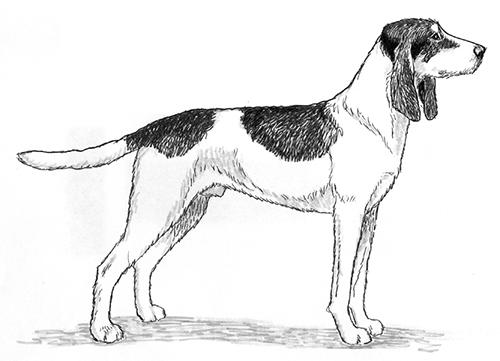
Importance of Early Training and Socialisation
Getting a Welsh Hound off to a good start with early training and socialisation is crucial. These dogs are naturally sociable, but introducing them to various environments, people, and other animals early on helps them grow into well-rounded adults. It’s all about setting the foundation for a confident and adaptable dog.
Recommended Training Techniques
When it comes to training, positive reinforcement is the way to go. Welsh Hounds respond well to treats, praise, and play. Consistency is key, as their independent nature can sometimes lead to stubbornness. Short, engaging training sessions work best to keep their attention and enthusiasm high.
Daily Exercise Requirements and Activities They Enjoy
Welsh Hounds are energetic and need plenty of exercise to stay happy. Think long walks, runs, or even agility training. They love activities that challenge both their bodies and minds. A game of fetch or a scent trail adventure can be particularly rewarding for them.
Health and Lifespan
Generally, Welsh Hounds are healthy dogs with a lifespan of around 10 to 14 years. Regular vet check-ups, a balanced diet, and plenty of exercise contribute to their well-being. Like any breed, they can be prone to certain health issues, so keeping an eye on their health is important.
Health and Care of the Welsh Hound
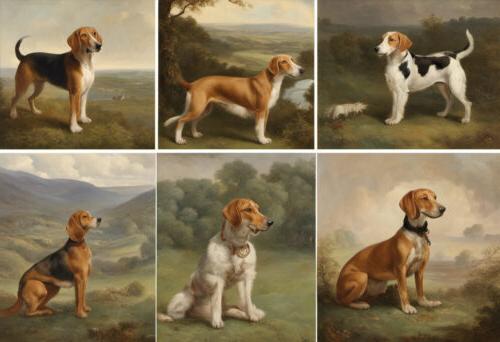
Common Health Issues
Welsh Hounds are generally robust, but like any breed, they can face certain health issues. Hip dysplasia and ear infections are common concerns. Regular vet visits can help catch these early. Keeping an eye on their weight is also crucial, as obesity can exacerbate joint problems.
Average Lifespan and Health Tips
With proper care, Welsh Hounds typically live between 10 to 14 years. To keep them healthy, ensure they get plenty of exercise and a balanced diet. Regular check-ups and vaccinations are essential to catch any potential issues early.
Preventative Care Recommendations
Preventative care is key. Regular dental cleanings, flea and tick prevention, and heartworm medication are all part of a good routine. Keeping their ears clean and dry can help prevent infections, especially if they spend a lot of time outdoors.
Grooming and Maintenance
Grooming a Welsh Hound is relatively straightforward. Their short coat requires weekly brushing to remove loose hair and keep it looking its best. Bathing should be occasional, as over-washing can strip their coat of natural oils. Regular nail trims and ear checks are also important to maintain their overall health.
Coat Care and Grooming for the Welsh Hound
Coat Care and Grooming Routines
The Welsh Hound’s short, dense coat is relatively low-maintenance, but regular grooming is still essential. A weekly brush will help remove loose hair and keep their coat looking sleek. This routine not only maintains their appearance but also strengthens the bond between you and your hound.
Shedding and Seasonal Grooming Tips
Welsh Hounds do shed, particularly during seasonal changes. During these times, you might need to increase brushing to a couple of times a week. This helps manage shedding and keeps your home a bit tidier. A good quality brush designed for short-haired breeds will make this task easier.
Diet and Nutrition
A balanced diet is crucial for the Welsh Hound’s health and vitality. High-quality dog food, rich in protein and essential nutrients, supports their active lifestyle. Portion control is important to prevent obesity, which can lead to joint issues. Always ensure they have access to fresh water, especially after exercise.
Nutritional Needs and Feeding for the Welsh Hound

Nutritional Needs for Optimal Health
Welsh Hounds thrive on a diet rich in protein and essential nutrients. Look for high-quality dog food that lists meat as the first ingredient. Omega-3 and Omega-6 fatty acids are also beneficial for their coat and skin health. Avoid foods with artificial additives and fillers, as these can lead to allergies and digestive issues.
Foods to Include and Avoid
Include lean meats, fish, and vegetables in their diet. These provide the necessary energy and nutrients for their active lifestyle. Avoid foods high in fat and sugar, as well as those containing artificial preservatives. Human foods like chocolate, grapes, and onions are toxic to dogs and should be kept out of reach.
Feeding Schedules and Portion Recommendations
Feed your Welsh Hound twice a day to maintain their energy levels. Portion sizes depend on their age, weight, and activity level, so consult your vet for specific recommendations. Always measure their food to prevent overfeeding, which can lead to obesity and related health issues.
Fun Facts and Trivia
Did you know that Welsh Hounds have been part of Welsh culture for centuries? Their keen sense of smell and stamina made them invaluable hunting companions. Despite their hunting background, they are known for their friendly and sociable nature, making them great family pets.
Interesting Tidbits and Famous Welsh Hounds
Interesting Tidbits about the Breed
The Welsh Hound is a breed steeped in history, with roots tracing back to ancient times. These dogs were specifically bred for their exceptional hunting abilities, making them a staple in Welsh hunting traditions. Their keen sense of smell and boundless energy allowed them to track game across the rugged Welsh terrain with ease. Despite their hunting prowess, Welsh Hounds are known for their friendly and sociable nature, making them excellent companions for families and hunters alike.
Famous Welsh Hounds in Media or History
Welsh Hounds have made their mark not just in the fields but also in media and history. One notable mention is their appearance in Welsh folklore, where they are often depicted as loyal companions to legendary hunters. In more recent times, Welsh Hounds have been featured in documentaries and books that explore the rich hunting traditions of Wales. Their reputation as skilled hunters and loyal companions has cemented their place in both history and popular culture.
Final Thoughts
The Welsh Hound is a remarkable blend of history and vitality. This breed’s rich heritage and energetic nature make it a unique companion for active families. Balancing their high exercise needs with their friendly temperament, Welsh Hounds offer both challenges and rewards to their owners. Embracing their hunting instincts and sociable nature can lead to a fulfilling relationship with these loyal dogs. Consider welcoming a Welsh Hound into your life if you’re ready for an adventurous and devoted partner.
